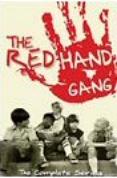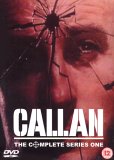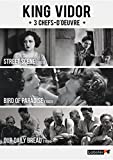 The Red Hand Gang - Series 1 - Complete | DVD | (01/09/2008)
from £12.99
| Saving you £12.00 (92.38%)
| RRP
The Red Hand Gang - Series 1 - Complete | DVD | (01/09/2008)
from £12.99
| Saving you £12.00 (92.38%)
| RRP Contains the complete classic television series The Red Hand Gang This short-lived 1970s American kids TV series was hugely popular in the UK and still retains a cult following today. Like an up-to-date Famous Five The Red Hand Gang was a group of five inner-city pre-teens who unwittingly found themselves foiling heists robberies and kidnaps. They were so called because they left their trademark red hand prints on fences to mark where they had been. The gang comprised of Frankie who was the oldest troublemaker JR tomboy Joanne brainy Doc Frankie's younger brother Lil' Bill and of course Boomer the dog!
 Callan - Series 1 Box Set | DVD | (03/09/2001)
from £N/A
| Saving you £N/A (N/A%)
| RRP
Callan - Series 1 Box Set | DVD | (03/09/2001)
from £N/A
| Saving you £N/A (N/A%)
| RRP Introduced in "A Magnum for Schneider", the hour-long 1967 Armchair Theatre episode of Callan written by James Mitchell about a disillusioned British secret agent of the same name (starring Edward Woodward), went on to offer four popular (if downbeat) series, a spin-off movie remaking the original story and a some-years-later wrap-up play "Wet Job". Remembered for its very distinctive opening titles, with a swinging broken-light bulb and a memorable theme tune, the series adopted a Deighton-LeCarré approach to the grim, treacherous, grubby business of Cold War espionage and made a TV star of the intense Woodward as the sweaty, sometimes conscience-stricken, sometimes robotic Callan. Even in the 21st century this still seems as strong, its complex stories and impressive performances outweighing a low-budget mix of video and film in the production that makes it seem less "professional" than other shows of the time. A great deal of the series opener is devoted to bringing on new regulars. There's a fresh Mr Hunter who, like Number Two on The Prisoner--with which Callan shares series editor George Markstein--was a title not a name, so several actors held the position over the course of the show. There's also the trendily mulleted thug Cross (Patrick Mower), who would go spectacularly off the rails in the next series and a half. In a dramatic device that has long since fallen out of fashion in television, Callan episodes tend to wind up by leaving the audience to work out all the connections of the plot while Callan himself sits gloomily and ponders the wretchedness of his squalid world. --Kim Newman
![Ku Klux Klan - A Secret History [DVD]](/pictures/1115715.jpg) Ku Klux Klan - A Secret History | DVD | (11/06/2012)
from £13.48
| Saving you £-3.49 (-34.90%)
| RRP
Ku Klux Klan - A Secret History | DVD | (11/06/2012)
from £13.48
| Saving you £-3.49 (-34.90%)
| RRP Discover the rituals and rites at the dark heart of America's most controversial organisation.At times, it has been among the most powerful and largest fraternal organizations in America, boasting up to four million members. It has survived for more than a century by wrapping its doctrine of hate and intolerance around the sacred cloth of Christianity and the fabric of American patriotism.The Ku Klux Klan: A Secret History goes beyond the flaming crosses and beneath the robes, to reveal the dark heart of this controversial organisation.
 Dennis Potter At London Weekend Television | DVD | (12/09/2005)
from £34.88
| Saving you £-14.89 (N/A%)
| RRP
Dennis Potter At London Weekend Television | DVD | (12/09/2005)
from £34.88
| Saving you £-14.89 (N/A%)
| RRP Dennis Potter has long been acknowledged as one of the most significant writers of the twentieth century. Though he had considerable successes with the series format (such as The Singing Detective and Casanova) it is generally accepted that his strongest work is the single play of which he did many for both the BBC and ITV. In celebration of both Potter's body of work and the fiftieth anniversary of ITV this collection celebrates three of his most signif
![The Time Of Your Life [1948]](/pictures/1012776.jpg) The Time Of Your Life | DVD | (01/07/2002)
from £6.45
| Saving you £10.54 (163.41%)
| RRP
The Time Of Your Life | DVD | (01/07/2002)
from £6.45
| Saving you £10.54 (163.41%)
| RRP When James Cagney starred in the movie adaptation of The Time of Your Life in 1948, it was hotly been debated whether William Saroyans stage play was really filmable at all. Because of its small cast, because all the action takes place on a single claustrophobic set, because the "plot" consists entirely of sub-plots, and because Saroyans "dirty sentimentality" isnt to everyones taste, such doubts are still understandable today. However, accept the movie for what it is--a play in a box--and youll be captivated. The story revolves around a slightly down-at-heel bar-restaurant, where a group of disparate characters come and go as their stories gradually unfold. They include an ex-prostitute desperately seeking a new life, a dancer looking for a break into showbusiness, a down-and-out who discovers a vocation as a pianist, a beer-sodden cowboy and a villainous "stoolie" who, needless to say, gets his comeuppance. This gaggle of misfits is presided over by an enigmatic, champagne-drinking philanthropist (brilliantly played by Cagney) who gently nudges them towards their goals while indulging his own fascination with the minutiae of daily life. Throughout this quietly delightful picture the audience are not told why hes this way, but it is possible to make an educated guess. On the DVD: The Time of Your Life might be a classic, but it apparently warrants no extra features. The black and white picture is 4:3. --Roger Thomas
![Rain [1932]](/pictures/1053390.jpg) Rain | DVD | (01/09/2003)
from £4.99
| Saving you £-1.00 (N/A%)
| RRP
Rain | DVD | (01/09/2003)
from £4.99
| Saving you £-1.00 (N/A%)
| RRP ![Callan - Series 1 - Part 2 Of 3 - Episodes 4 - 6 [1970]](/pictures/1033592.jpg) Callan - Series 1 - Part 2 Of 3 - Episodes 4 - 6 | DVD | (03/09/2001)
from £15.85
| Saving you £0.14 (0.88%)
| RRP
Callan - Series 1 - Part 2 Of 3 - Episodes 4 - 6 | DVD | (03/09/2001)
from £15.85
| Saving you £0.14 (0.88%)
| RRP Introduced in "A Magnum for Schneider", the hour-long 1967 Armchair Theatre episode written by James Mitchell about a disillusioned British secret agent Callan (Edward Woodward), went on to offer four popular (if downbeat) series, a spin-off movie remaking the original story and a some-years-later wrap-up play "Wet Job". Remembered for its very distinctive opening titles, with a swinging broken light bulb and a memorable theme tune, the series adopted a Deighton-LeCarré approach to the grim, treacherous, grubby business of Cold War espionage and made a TV star of the intense Woodward as the sweaty, sometimes conscience-stricken, sometimes robotic Callan. Even in the 21st century this still seems a strong show, its complex stories and impressive performances outweighing a low-budget mix of video and film in the production that makes it seem less "professional" than other shows of the time. In a dramatic device that has long since fallen out of fashion in television, Callan episodes tend to wind up by leaving the audience to work out all the connections of the plot while Callan himself sits gloomily and ponders the wretchedness of his squalid world. --Kim Newman
![Callan - Series 1 - Part 1 Of 3 - Episodes 1 - 3 [1970]](/pictures/1033591.jpg) Callan - Series 1 - Part 1 Of 3 - Episodes 1 - 3 | DVD | (03/09/2001)
from £6.98
| Saving you £9.01 (129.08%)
| RRP
Callan - Series 1 - Part 1 Of 3 - Episodes 1 - 3 | DVD | (03/09/2001)
from £6.98
| Saving you £9.01 (129.08%)
| RRP Introduced in "A Magnum for Schneider", the hour-long 1967 Armchair Theatre episode of Callan written by James Mitchell about a disillusioned British secret agent of the same name (starring Edward Woodward), went on to offer four popular (if downbeat) series, a spin-off movie remaking the original story and a some-years-later wrap-up play "Wet Job". Remembered for its very distinctive opening titles, with a swinging broken-light bulb and a memorable theme tune, the series adopted a Deighton-LeCarré approach to the grim, treacherous, grubby business of Cold War espionage and made a TV star of the intense Woodward as the sweaty, sometimes conscience-stricken, sometimes robotic Callan. Even in the 21st century this still seems as strong, its complex stories and impressive performances outweighing a low-budget mix of video and film in the production that makes it seem less "professional" than other shows of the time. A great deal of the series opener is devoted to bringing on new regulars. Theres a fresh Mr Hunter who, like Number Two on The Prisoner--with which Callan shares series editor George Markstein--was a title not a name, so several actors held the position over the course of the show. Theres also the trendily mulleted thug Cross (Patrick Mower), who would go spectacularly off the rails in the next series and a half. In a dramatic device that has long since fallen out of fashion in television, Callan episodes tend to wind up by leaving the audience to work out all the connections of the plot while Callan himself sits gloomily and ponders the wretchedness of his squalid world. --Kim Newman
![The Time Of Your Life [1948]](/pictures/1013075.jpg) The Time Of Your Life | DVD | (01/07/2001)
from £N/A
| Saving you £N/A (N/A%)
| RRP
The Time Of Your Life | DVD | (01/07/2001)
from £N/A
| Saving you £N/A (N/A%)
| RRP When James Cagney starred in the movie adaptation of The Time of Your Life in 1948, it was hotly been debated whether William Saroyans stage play was really filmable at all. Because of its small cast, because all the action takes place on a single claustrophobic set, because the "plot" consists entirely of sub-plots, and because Saroyans "dirty sentimentality" isnt to everyones taste, such doubts are still understandable today. However, accept the movie for what it is--a play in a box--and youll be captivated. The story revolves around a slightly down-at-heel bar-restaurant, where a group of disparate characters come and go as their stories gradually unfold. They include an ex-prostitute desperately seeking a new life, a dancer looking for a break into showbusiness, a down-and-out who discovers a vocation as a pianist, a beer-sodden cowboy and a villainous "stoolie" who, needless to say, gets his comeuppance. This gaggle of misfits is presided over by an enigmatic, champagne-drinking philanthropist (brilliantly played by Cagney) who gently nudges them towards their goals while indulging his own fascination with the minutiae of daily life. Throughout this quietly delightful picture the audience are not told why hes this way, but it is possible to make an educated guess. On the DVD: The Time of Your Life might be a classic, but it apparently warrants no extra features. The black and white picture is 4:3. --Roger Thomas
![Callan - Series 1 - Part 3 Of 3 - Episodes 7 - 9 [1970]](/pictures/1033593.jpg) Callan - Series 1 - Part 3 Of 3 - Episodes 7 - 9 | DVD | (03/09/2001)
from £11.92
| Saving you £4.07 (34.14%)
| RRP
Callan - Series 1 - Part 3 Of 3 - Episodes 7 - 9 | DVD | (03/09/2001)
from £11.92
| Saving you £4.07 (34.14%)
| RRP Introduced in "A Magnum for Schneider", the hour-long 1967 Armchair Theatre episode written by James Mitchell about a disillusioned British secret agent Callan (Edward Woodward), went on to offer four popular (if downbeat) series, a spin-off movie remaking the original story and a some-years-later wrap-up play "Wet Job". Remembered for its very distinctive opening titles, with a swinging broken light bulb and a memorable theme tune, the series adopted a Deighton-LeCarré approach to the grim, treacherous, grubby business of Cold War espionage and made a TV star of the intense Woodward as the sweaty, sometimes conscience-stricken, sometimes robotic Callan. Even in the 21st century this still seems a strong show, its complex stories and impressive performances outweighing a low-budget mix of video and film in the production that makes it seem less "professional" than other shows of the time. In a dramatic device that has long since fallen out of fashion in television, Callan episodes tend to wind up by leaving the audience to work out all the connections of the plot while Callan himself sits gloomily and ponders the wretchedness of his squalid world. --Kim Newman
![Our Town [DVD]](/pictures/1098635.jpg) Our Town | DVD | (08/03/2010)
from £N/A
| Saving you £N/A (N/A%)
| RRP
Our Town | DVD | (08/03/2010)
from £N/A
| Saving you £N/A (N/A%)
| RRP Our Town
![The Postman Always Rings Twice [1981]](/pictures/1020676.jpg) The Postman Always Rings Twice | DVD | (06/12/1999)
from £N/A
| Saving you £N/A (N/A%)
| RRP
The Postman Always Rings Twice | DVD | (06/12/1999)
from £N/A
| Saving you £N/A (N/A%)
| RRP In The Postman Always Rings Twice, Jack Nicholson teamed up again with his Five Easy Pieces and King of Marvin Gardens director Bob Rafelson for this 1981 version of James M. Cain's hardboiled novel of lust and murder. This version takes a much grittier (and sexually explicit) approach to the material than the slick 1946 MGM version starring John Garfield and Lana Turner. Nicholson plays Frank Chambers, a drifter who happens upon a roadside diner run by Cora Papadakis (Jessica Lange) and her swarthy Greek husband, Nick (John Colicos). Sparks fly, and before you can say l'amour fou, Frank and Cora are making the beast with two backs on the kitchen table. One thing leads to another and they conspire to murder Nick. The movie is still a little too cold and distant to fully convey a hot-blooded passion that leads to murder, but it is a strangely haunting and disturbing film nevertheless. The screenplay is by David Mamet, the photography is by the great Sven Nykvist (Ingmar Bergman's cinematographer), and watch for Anjelica Huston in a supporting role. --Jim Emerson
 Hamlet | DVD | (04/08/2003)
from £4.93
| Saving you £9.32 (253.95%)
| RRP
Hamlet | DVD | (04/08/2003)
from £4.93
| Saving you £9.32 (253.95%)
| RRP Will Houston plays the lead role in this adaptation of Shakespeare's play....
 3 Classics Of The Silver Screen - Vol. 7 - Our Town / The Star Packer / Rocket Ship XM | DVD | (01/11/2004)
from £N/A
| Saving you £N/A (N/A%)
| RRP
3 Classics Of The Silver Screen - Vol. 7 - Our Town / The Star Packer / Rocket Ship XM | DVD | (01/11/2004)
from £N/A
| Saving you £N/A (N/A%)
| RRP Our Town: Follows the lives and events of two families in a woodsy New Hampshire village from the year 1900 through 1913. William Holden and Martha Scott both reprising their roles from the Broadway production meet as teenagers and succumb to adolescent affections before maturing marrying and bearing a child of their own. The Star Packer: Fast-paced western adventure with Wayne playing the marshall who must straighten out a gang of criminals while still finding tim
![Callan - Third Series [DVD]](/pictures/1151720.jpg) Callan - Third Series | DVD | (03/02/2007)
from £N/A
| Saving you £N/A (N/A%)
| RRP
Callan - Third Series | DVD | (03/02/2007)
from £N/A
| Saving you £N/A (N/A%)
| RRP  KING VIDOR - 3 CHEFS-D.. - MOV | DVD | (31/08/2017)
from £N/A
| Saving you £N/A (N/A%)
| RRP
KING VIDOR - 3 CHEFS-D.. - MOV | DVD | (31/08/2017)
from £N/A
| Saving you £N/A (N/A%)
| RRP 
Please wait. Loading...
This site uses cookies.
More details in our privacy policy